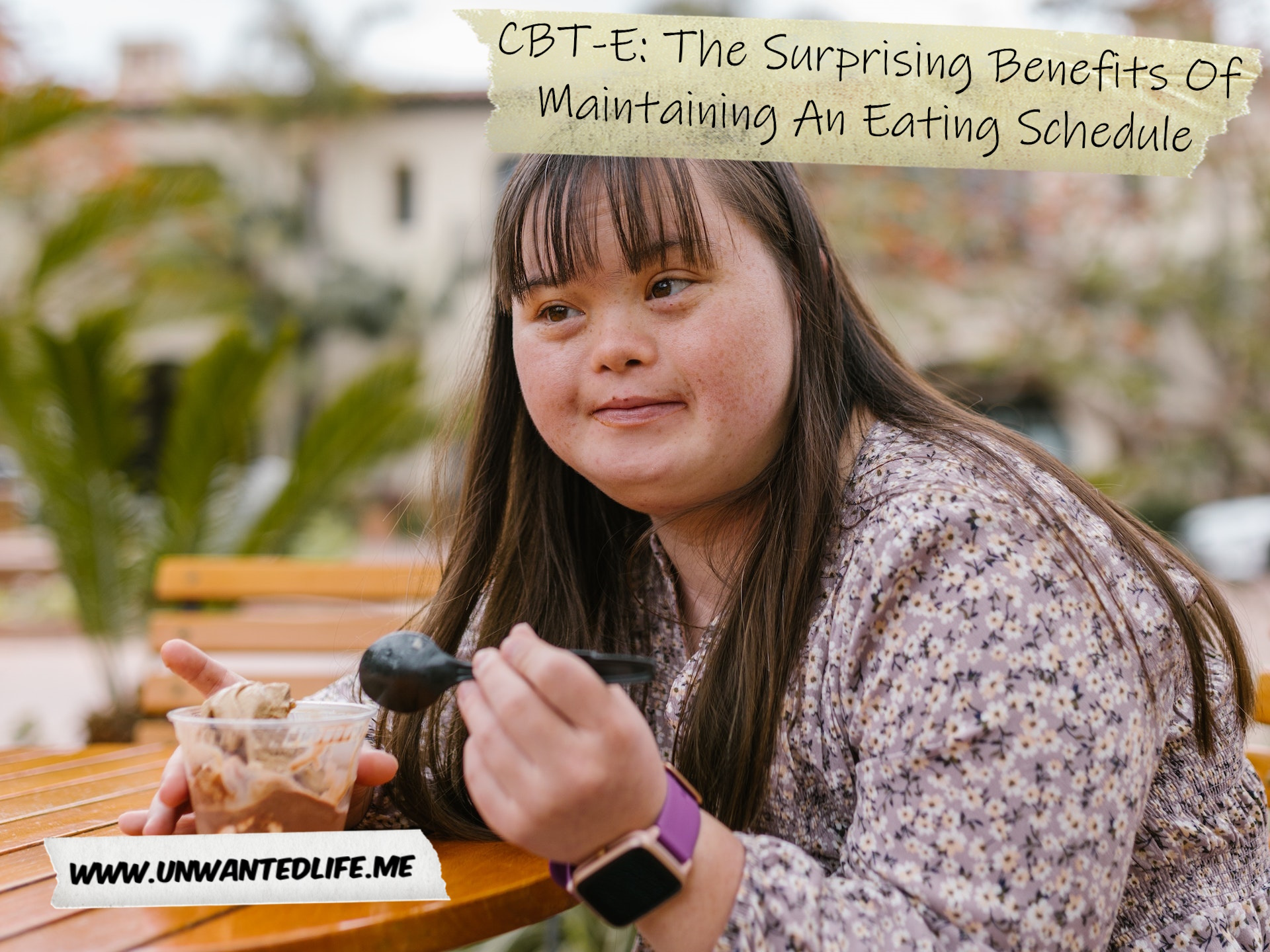Earlier this year, I finally started therapy for my issues with food, which, at this time, was classified as a binge eating disorder. The main reason for this shift is that I can’t starve myself like I used to do for well over a decade, because of my reactive hypoglycaemia. Hence them no longer seeing me as having bulimia.
However, for me, it is very much there. Every fibre of my body wants me to go without food because I find food boring and bland. There’s even a case for me having ARFID. Anyway, I learnt the merits of keeping a food schedule and meal planning while at my eating disorders therapy, and so I’m sharing that with you.
Disclosure: This article contains links to my Unwanted Life Shop. Read my full disclosure here.
Why Have An Eating Schedule And Meal Planner?
As I said during my opening to this article, a food schedule and meal planner are really useful for managing and overcoming eating disorders, which is why it’s recommended in cognitive behaviour therapy for eating disorders (CBT-E).
However, the usefulness of an eating schedule and meal planner doesn’t start and end with treating eating disorders. I mean, it should have been something recommended to me when I was diagnosed with reactive hypoglycaemia. More specifically, its insulin resistance, but it manifests as reactive hypoglycaemia. But you don’t have to have a mental health or health reason for having an eating schedule or using a meal planner. It’s also a great way to establish a healthy eating habit in general.

Eating routines are an important topic because our eating routine will affect our behaviours and influence our nutrition and health (Jastran, Bisogni, Sobal, Blake, and Devine, 2009). For example, there’s such a thing as the ‘hungry judge effect‘, where judges are more inclined to be lenient after eating but be more severe before a break for lunch.
Our bodies require a steady stream of energy from the food we eat to operate at their best. The best way to do this is to eat something at least every four hours. Creating an eating schedule and meal plan can turn the consistency of eating at the same times each day into a habit. This can also help control overeating, as well as helping to reduce hunger and starvation symptoms. All of which is important when you’re being treated for binge eating.
Planning our meals can help reduce issues, such as decision fatigue if we plan our meals a week or more in advance. This is supported by Jastran, Bisogni, Sobal, Blake, and Devine (2009) who state that eating routines, just like any routine, simplify daily activities, allowing our lives to run more smoothly. This will allow us to put less effort into more mundane tasks. It can also reduce temptations to graze by keeping your energy levels at a more optimal and sustained level.
Often, eating disorders develop as a form of control in a situation where you feel you might not have any control. According to the NHS, this is a common way for children, teens, and young adults to develop an eating disorder. Thus, an eating schedule and meal planner can help maintain that sense of control and agency (Jastran, Bisogni, Sobal, Blake, and Devine, 2009), while also allowing them to develop healthier eating habits.
However, to be clear, just because control is a possible reason for an eating disorder to develop, it, unfortunately, isn’t the only cause or factor in eating disorders developing. It would be very reductionist and potentially harmful to reduce all causes of eating disorders down to wanting control (Branley-Bell, Talbot, Downs, Figueras, Green, McGilley, and Murphy-Morgan, 2023).
Biological Basis For An Eating Schedule And Meal Planner
As you may already be aware, our bodies have their own 24-hour clock known as the circadian clock. This clock exists in pretty much every cell of our bodies and helps our bodies function by coordinating our daily activities by releasing hormones (Manoogian, Chaix, and Panda, 2019). So, the same reason why a morning routine and a sleep routine are good for our wellbeing, is the same argument for having an eating schedule. This means that having an erratic eating routine can also cause the rest of our circadian rhythm to go out of sync.
A study by Allison et al. (2021) looked into the benefits of having an eating schedule. They found that their eight-week eating schedule promoted weight loss and led to improvements in energy metabolism and insulin in adults. Something that could benefit people with conditions like insulin resistance and reactive hypoglycaemia.
Eating Schedule And Meal Planner
As I lay out in my food schedule and meal planner, to best achieve the adoption of a healthy eating habit, you should eat no more than three meals and three snacks a day. Using the tables in my planner, you’ll be able to plan what meals and snacks you’ll have each day at specific times. Then tick them off if you manage to eat those meals and snacks at the times specified. This will allow you to keep track of your progress in adopting the new healthy eating habit but also allow you to get a sense of achievement as well, much like you get when ticking off items on a to-do list.
When you first start using the food schedule and meal planner, allow yourself a 30-60 minute leeway, but work towards eating at the exact times specified. Remember, the longer you follow this schedule, the easier it’ll be for the habit to form.
You can find my ‘Food Schedule And Meal Planner’ over at my shop by clicking here.
Summary
Having an eating schedule and a meal planner is a great way to overcome issues with food because of an eating disorder, no matter the disorder. But, it’s not limited to just being useful in the treatment of mental health. The great thing about having an eating schedule and keeping a meal planner is how much it can benefit your overall wellbeing. It’s great for our health, and it’s great at getting us to adopt a healthier lifestyle, which is better than any fad diet.
So whether you have issues with eating or not, check out my ‘Food Schedule And Meal Planner’ and see what it can do for you and your overall health. Then let me know how it goes. I’d love to get feedback.
As always, leave your feedback in the comments section below. Also, please share your experiences with using an eating schedule in the comments section below as well. Don’t forget, if you want to stay up-to-date with my blog, then sign up for my newsletter below. Alternatively, get push notifications for new articles by clicking the red bell icon in the bottom right corner.
Lastly, if you’d like to support my blog, you can make a donation of any size below. Until next time, Unwanted Life readers.
References
Allison, K. C., Hopkins, C. M., Ruggieri, M., Spaeth, A. M., Ahima, R. S., Zhang, Z., Taylor, D. M., & Goel, N. (2021). Prolonged, controlled daytime versus delayed eating impacts weight and metabolism. Current Biology, 31(3), 650-657. Retrieved from https://www.cell.com/current-biology/pdf/S0960-9822(20)31669-9.pdf and https://www.sciencedirect.com/science/article/pii/S0960982220316699.
Branley-Bell, D., Talbot, C. V., Downs, J., Figueras, C., Green, J., McGilley, B., & Murphy-Morgan, C. (2023). It’s not all about control: challenging mainstream framing of eating disorders. Journal of Eating Disorders, 11(1), 1-8. Retrieved from https://jeatdisord.biomedcentral.com/articles/10.1186/s40337-023-00752-9.
Jastran, M. M., Bisogni, C. A., Sobal, J., Blake, C., & Devine, C. M. (2009). Eating routines. Embedded, value based, modifiable, and reflective. Appetite, 52(1), 127–136. Retrieved from https://doi.org/10.1016/j.appet.2008.09.003 and https://www.ncbi.nlm.nih.gov/pmc/articles/PMC2644457.
Manoogian, E. N., Chaix, A., & Panda, S. (2019). When to eat: the importance of eating patterns in health and disease. Journal of Biological Rhythms, 34(6), 579-581. Retrieved from https://journals.sagepub.com/doi/full/10.1177/0748730419892105.



Thank you for sharing your personal journey and insights into managing eating disorders through CBT-E and the benefits of maintaining an eating schedule and meal planning. Your transparency about your experiences adds depth to the discussion. It’s clear that these strategies can have a positive impact not only on those with eating disorders but on overall well-being. I appreciate the informative read! 🍽️✨
Thanks for reading my article and taking the time to comment
It sounds like an eating schedule works well.
Something we agree on 🙂
Happy you shared your journey so others who are going through the same thing can know that they aren’t alone and that they will come through
Thanks for commenting
I hope that sticking to your schedule helps with your food issues! I use an app to track my food intake, not for the same reasons but I find accountability on paper is a solid adjunct to stay on track, whatever the reason. Thanks for sharing your challenges with us.
Thanks for commenting
I agree with you, scheduling is very useful. My friend who going through this is also following that. And he is happy with progress of managing it.
Thanks for sharing